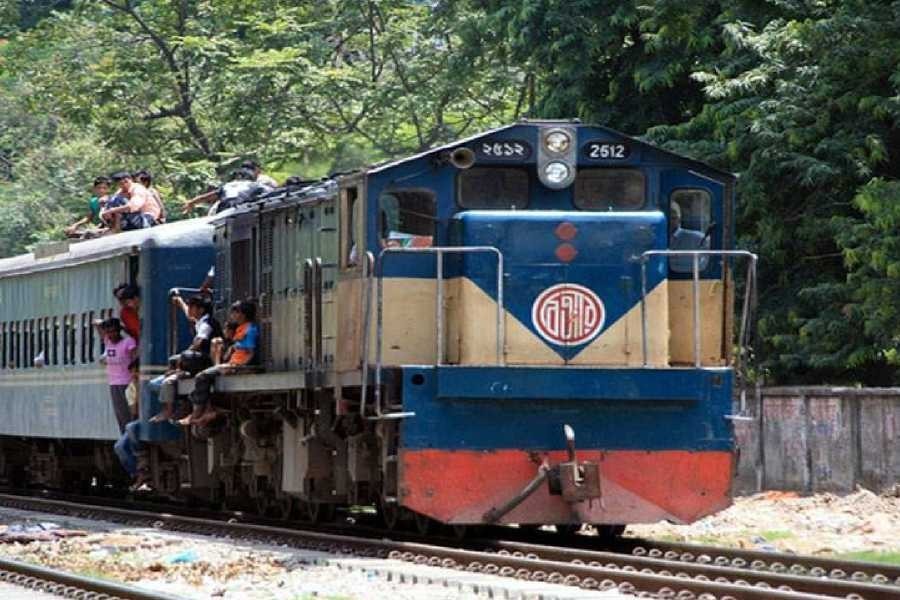Many in their 70s to 80s might remember the Bangla textbook story of how a village boy saved a train from a disaster. The story depicts how a boy employed his ready wit when he discovered the small bridge beside a forest lying collapsed after a tornado the previous night. By waving a red 'gamchha' (towel) standing on the rail-track several yards backward, he was able to attract the attention of the driver. He stopped the train. Or else several passengers travelling it would have met a disastrous accident. A similar episode was repeated in Bangladesh in the 1990s, in which a primary school student used his intelligence in stopping a full-speed mail train. He had detected large portion of railway track missing.
Of late, the unusual incidents involving villagers saving trains from accidents have been on a sharp increase. Just a fortnight ago, a level crossing staff averted a disastrous rail accident at an outlying area in Rajshahi district. A similar successful attempt by a boy to avert yet another rail mishap followed in a week's time. Earlier in 2017, two school boys on one winter morning detected abnormal gaps between the two tracks on the railway line. It ran by the side of their village. Finding no adult nearby to seek advice, the boys felt bewildered. A freight train carrying oil tankers was approaching fast. Out of their reflex, the boys used their multi-colour warm clothes to signal frantically at the driver to stop the train. The train stopped at a short distance from the spot of the faulty lines. The spot was located in the Baghaupazilla in Rajshahi. It falls under the Western Railway Zone.
Several episodes like these occurred in the country over the last few years. The news media has been insistently focused on the fast deteriorating condition of the railway operation. Outwardly, the country's railway sector has continued to undergo expansions, especially through the widening of its railway networks in both the two zones: Eastern and Western. In the last one-and-half decades, several inter-city railway services were pressed into service. Besides, a couple of passenger train routes opened in the two zones. At the same time, due to acute dearth of engine crew and field operational staff, some major trains continue to get away with their poor services. A severe blow was dealt to the Bangladesh Railway (BR) during the two-year novel corona pandemic. During the period, 16 trains on the Dhaka-Chattogram route remained suspended. Barring short-time resumption of services during the presumed declines in the pandemic's severity, railway services remained virtually closed throughout the country.
To the great relief of the regular railway travellers, BR in a recast schedule put into service 35 inter-city trains from January 10. Thanks to the strict enforcement of the pandemic-induced health protocols leading to bus service at half capacity, fare hikes, drop in the number of long-haul buses etc forced people to avoid highway coaches. Majority of them opted for trains. Thus BR has been offered a great opportunity to recoup its losses incurred during the 2-year Covid-19 shutdown. Newer openings to better times await this 160-year-old national transport sector. Beginning on a 53.11-kilometrebroad gaugeline in south-western Bengal in 1862, the railway line kept lengthening through years moving across East Bengal, East Pakistan and now Bangladesh. In the 160 years, the railway operated under Eastern Bengal Railway and Bengal Assam Railway --- of which Eastern Bengal Railway became a part. After the 1947 partition, the eastern Pakistan's railway was called Pakistan Eastern Railway, which later came to be known as Bangladesh Railway (BR).
The Bangladesh Railway has been witness to the passing of an eventful period. During this long time, the railway sector should have passed through phases of both short-length and long-length progresses. Any remarkable infrastructural advancement had not been expected from the exploitative Pakistani central rulers. Unfortunately, the sector in independent Bangladesh could not come up with any remarkable strides either. Being a small sovereign territory, Bangladesh has no cogent reasons for failure to take its railway sector to a highly developed level. But it faltered in its national task. The prematurely decaying railway structure it had inherited from Pakistan underwent a few cosmetic brush-ups, instead ofoverhaul.
It's true the new but war-torn state lacked the funds required for raising a completely renovated and new-age railway system from the ruins. But after the phases of unsteadiness, when it stood firmly with funds coming from different agencies abroad, it couldn't use those. Incredibly large sums of foreign aid reaching the country for the railway sector allegedly went unaccounted for. Irregularities reigned supreme.
Despite the sector's humble start with a tolerable length of railway line, in 2009 it could boast of 3,600km metre gauge and broad gauge tracks in its Western and Eastern zones across the country. Finding this means of mid- and long-distance travel convenient in many ways, people began preferring it to other communications --- bus in particular. Unfortunately, the railway authorities failed to perform up to the expectation of the regular passengers. Despite its bouts of improvement in performance lately, shortcomings continue in many other related sectors.
Over a decade ago, Bangladesh Railway owned 90 inter-city trains, 52 mail or express trains, 64 commuter (DEMU) trains, 135 shuttle trains and two Bangladesh-India trains. Except the commuter trains, now reduced to 19 from 64, all of the services are in operation. Yet these trains, including a handful of high-end inter-city ones, seem to be inadequate against the demand. The demand keeps soaring. Repeated near-occurrence of accidents cannot keep the passengers away. But truth is unsavoury. Prompted by the system's many loopholes and lax supervision, a major accident might occur anytime. The railway authorities should ensure those do not happen.


